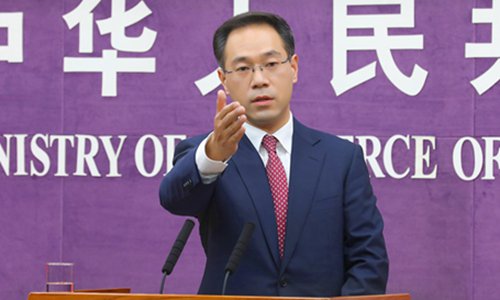HOME >> SOURCE
RCEP likely to be signed on schedule at end of 2020: official
By Xie Jun Source:Global Times Published: 2020/3/19 21:13:40

China's Ministry of Commerce (MOFCOM) spokesperson Gao Feng at the press conference on Thursday Photo: MOFCOM website
China is working with other countries to keep the signing of the massive Asia-Pacific trade pact, the Regional Comprehensive Economic Partnership (RCEP), on schedule, which should be around the end of this year, a Chinese government official said.Currently, members of the pact are pushing work related to signing it, such as examining legal documents, according to Gao Feng, a spokesperson for the Ministry of Commerce. A total of 16 countries including China, Japan and Australia should sign the pact, according to media reports.
Apart from the RCEP, China is also speeding up the China-Japan-South Korea free trade zone negotiations, while pushing free trade talks with countries like Israel, Norway and Sri Lanka, Gao said.
There have been worries about whether the progress of free trade pacts like the RCEP and free trade talks will be interrupted as global trade takeshefty losses from the coronavirus epidemic.
"The fact that China is still pushing free trade pacts like the RCEP shows that its determination to propel free trade is unshakeable, whether by countries like the US or by diseases like the coronavirus," Tu Xinquan, said dean of the China Institute for WTO Studies at the University of International Business and Economics in Beijing.
According to Tu, effects of the RCEP on China's foreign trade will not be immediate, but it will boost market confidence and push companies to make business arrangements in relevant countries ahead of schedule.
Jiang Fan, a government official at the Ministry of Commerce, told the Global Times that although the coronavirus has brought a negative impact to global industrial and supply chains, China is still confident of stabilizing the fundamentals of foreign trade.
"China's foreign trade is resilient and has ample leeway. The positive development trend of the country's foreign trade will not change in the long term," said Jiang.
But Jiang noted that with the coronavirus spreading to more than 160 countries and regions, trade companies will face reduced foreign demand and decreasing orders for "some time to come."
Tu also told the Global Times that it's very probable that China's overseas trade will see negative growth this year, but foreign trade will rebound quickly once the virus wanes.
Posted in: ECONOMY